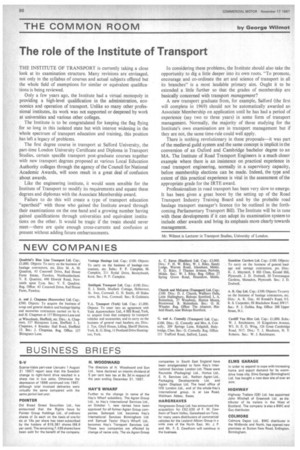The role of the Institute of Transport
Page 98

If you've noticed an error in this article please click here to report it so we can fix it.
THE INSTITUTE OF TRANSPORT is currently taking a close look at its examination structure. Many revisions are envisaged, not only in the syllabus of courses and actual subjects offered but the whole field of exemptions for similar or equivalent qualifications is being reviewed.
Only a few years ago, the Institute had a virtual monopoly in providing a high-level qualification in the administration, economics and operation of transport. Unlike so many other professional institutes, its work was not supported or deepened by work at universities and various other colleges.
TheInstitute is to be congratulated for keeping the flag flying for so long in this isolated state but with interest widening in the whole spectrum of transport education and training, this position has left a legacy of problems.
The first degree course in transport at Salford University, the part-time London University Certificate and Diploma in Transport Studies, certain specific transport post-graduate courses together with new transport degrees proposed at various Local Education Authority colleges through the agency of the Council for National Academic Awards, will soon result in a great deal of confusion about awards.
Like the engineering institute, it would seem sensible for the Institute of Transport to modify its requirements and equate these degrees and diplomas with the Associate Membership award.
Failure to do this will create a type of transport education "apartheid" with those who gained the Institute award through their examinations on the one hand and a growing number having gained qualifications through universities and equivalent institutions on the other. It would be tragic if the twain should never meet—there are quite enough cross-currents and confusion at present without adding future embarrassments.
In considering these problems, the Institute should also take the opportunity to dig a little deeper into its own roots. "To promote, encourage and co-ordinate the art and science of transport in all its branches" is a most laudable primary aim. Ought it to be extended a little further so that the grades of membership are basically concerned with transport management?
A new transport graduate from, for example, Salford (the first will complete in 1969) should not be automatically awarded an Associate Membership on application until he has had a period of experience (say two to three years) in some form of transport management. Normally, the majority of those studying for the Institute's own examination are in transport management but if they are not, the same time-rule could well apply.
There is nothing revolutionary in these proposals—it was part of the medieval guild system and the same concept is implicit in the conversion of an Oxford and Cambridge bachelor degree to an MA. The Institute of Road Transport Engineers is a much closer example where there is an insistence on practical experience in road transport engineering, normally in a supervisory capacity, before membership elections can be made. Indeed, the type and extent of this practical experience is vital in the assessment of the appropriate grade for the IRTE award.
Professionalism in road transport has been very slow to emerge. It has been given a great boost by the setting up of the Road Transport Industry Training Board and by the probable road haulage transport manager's licence (to be outlined in the forthcoming Parliamentary Transport Bill). The Institute will be in tune with these developments if it can adopt its examination system to include other awards and bring its emphasis more clearly towards management.
















































































































































